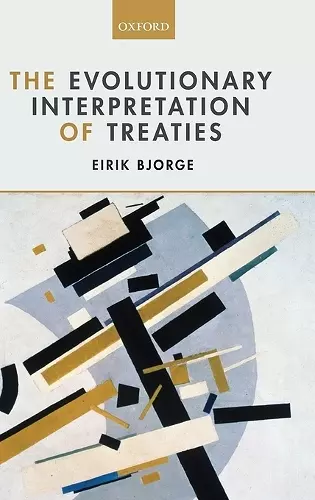The Evolutionary Interpretation of Treaties
Format:Hardback
Publisher:Oxford University Press
Published:17th Jul '14
Currently unavailable, and unfortunately no date known when it will be back

Awarded the 2015 Gold Medal of the King of Norway
The question of whether the meaning of terms used in treaties can evolve over time is highly contentious within international law. This book examines how treaties should be interpreted, and how best to marry the intention of the parties to the treaty with the changing socio-political context over time.If an old treaty regulating 'commerce' or forbidding 'degrading treatment of persons' is to be interpreted decades after its conclusion, does 'commerce' or 'degrading treatment of persons' have the same meaning at the time of interpretation as they had when the treaty was concluded? The evolutionary interpretation of treaties has proven one of the most controversial topics in the practice of international law. Indeed, it has been seen as going against the very grain of the law of treaties, and has been argued to be contrary to the intention of the parties, breaching the principle of consent. This book asks what the place of evolutionary interpretation is within the understanding of treaties, at a time when many important international legal instruments are over five decades old. It sets out to place the evolutionary interpretation of treaties on a firm footing within the Vienna rules of interpretation, as codified in Articles 3133 of the Vienna Convention on the Law of Treaties. The book demonstrates that the evolutionary interpretation of treatiesin common with all other types of interpretationis in fact based upon an objective understanding of the intention of the parties. In order to marry intention and evolution, the book argues that, on the one hand, evolutionary interpretation is the product of the correct application of Articles 3133 and, on the other, that Articles 3133 are geared towards the objective establishment of the intention of the parties. The evolutionary interpretation of treaties is therefore shown to represent an intended evolution.
Bjorges argument is clearly made, and is clearly based on a formidable comprehension of the International Law Commission materials, the case law, and literature, including the French-language literature... Bjorge makes a valuable contribution to our understanding of both evolutionary interpretation in particular and treaty interpretation generally. * Ryan Manton, Law Quarterly Review *
This excellent book leads us to the heart of international law through its tensions between stability, change, unilateralism and objectivism with a highly balanced and well grounded lawyerly view. It will be indispensable to anyone - both academics and practitioners - concerned with the interpretation and application of treaties. * Professor Attila Tanzi, Chair of International Law, University of Bologna *
ISBN: 9780198716143
Dimensions: 239mm x 163mm x 23mm
Weight: 518g
240 pages